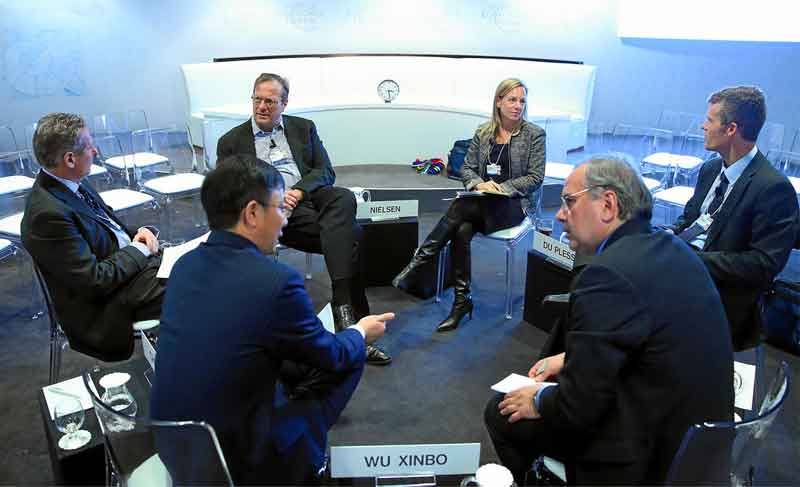Secretary of Homeland Security Kirstjen M. Nielsen traveled to Davos, Switzerland this week for the World Economic Forum and met with international partners and industry leaders to discuss the importance of public-private partnerships in advancing a global security agenda.
Secretary Nielsen discussed U.S.-led efforts to raise global security standards to prevent terrorist travel.
International partners must work together to collect, use, and share airline passenger information, including Passenger Name Record (PNR) data, to detect and disrupt threats.
(Politicians and business leaders from across the globe are gathering in the Swiss Alps, for the annual World Economic Forum. Courtesy of Al Jazeera and YouTube. Posted on Jan 23, 2018)
The Secretary also discussed the importance of biometric data in making cross-border travel faster and more secure.
In addition to preventing terrorists from traveling internationally, Secretary Nielsen discussed the importance of fighting radicalization at home.
Terrorist groups have become highly networked online, allowing them to spread propaganda worldwide, recruit online, evade detection by plotting in virtual safe havens, and crowd-source attacks.
DHS is finding more effective ways to identify terrorists, and working with international and industry partners to find innovative ways to detect and disrupt their plots.
There is robust and ongoing engagement between the U.S. Government and the technology sector to increase efforts to counter terrorists’ use of the internet, including countering terrorist messaging online.
The World Economic Forum also launched the Global Centre for Cybersecurity, a public-private partnership formed to examine pressing cybersecurity challenges and devise solutions to global problems with direct impacts on the United States.
(Press conference announcing the Global Centre for Cybersecurity. Courtesy of the World Economic Forum and YouTube. Posted on Jan 23, 2018)
Given the cyber landscape risks, the Forum has recognized the need for a global centre of excellence focused on cyber.
As such they have decided to launch a new public-public private platform in the form of a Global Centre for Cybersecurity dedicated to:
- Strengthening cyber resilience and robustness
- Establish an independent cyber library of best practices
- Act as a think-tank, especially in determining future cybersecurity scenarios
- Assist regions which are less cyber developed in establishing their national/regional cyber strategy and certification in cyber preparedness
- Provide educational opportunities to partners to enhance knowledge on cybersecurity
- Consolidate and advance the implementation of all existing Forum cybersecurity initiatives
(Learn More. Courtesy of the World Economic Forum and YouTube. Posted on Jan 23, 2018)
Government and industry will use the unique convening ability of the World Economic Forum, drawing together stakeholders in a sense of shared responsibility, to improve the security and resilience of the cyber ecosystem.
Secretary Nielsen affirmed DHS’s commitment to work closely with the Centre to determine priority areas of focus to ensure maximum impact.
Under Secretary Nielsen’s leadership, DHS is taking an increasingly active role in protecting the American people from the range cybersecurity threats, whether state or non-state based.
Secretary Nielsen discussed the need for greater collaboration to better understand the risks facing the critical functions and services that support our economy and way of life.
Recognizing that an organization’s risk doesn’t end at the network’s edge, among other efforts, DHS is prioritizing expanded information sharing with the private sector, a priority outlined in President Trump’s most recent National Security Strategy.
(Learn More. President Donald Trump is the first sitting president in the last 18 years to attend Davos. In his address, he stressed that America is open for business. Courtesy of the World Economic Forum and YouTube. Posted on Jan 26, 2018)
This approach, rooted in the concept of collective defense, underscores the need to share as broadly as possible to dramatically reduce known threats and vulnerabilities, freeing up organizations to focus on more sophisticated threats.
During a roundtable discussion with industry leaders, Secretary Nielsen also discussed the continued threats facing soft targets and crowded places, and the importance of sharing leading practices and incentivizing security investments for these venues.
Additionally, she stressed the importance of instilling a culture of awareness, vigilance, and preparedness across the general public.

The Secretary also had numerous conversations with global experts to discuss DHS efforts to assist persons fleeing persecution around the globe.
DHS remains committed to being a partner to countries working to support displaced persons.
Secretary Nielsen was part of a high-level U.S. delegation led by President Donald J. Trump in discussing America’s role leading the world in economic and physical security.
 Other members of the delegation included Secretary of Treasury Steve Mnuchin, Secretary of State Rex Tillerson, Secretary of Commerce Wilbur Ross, Secretary of Labor Alex Acosta, Secretary of Transportation Elaine Chao, Secretary of Energy Rick Perry, and United States Trade Representative Robert Lighthizer.
Other members of the delegation included Secretary of Treasury Steve Mnuchin, Secretary of State Rex Tillerson, Secretary of Commerce Wilbur Ross, Secretary of Labor Alex Acosta, Secretary of Transportation Elaine Chao, Secretary of Energy Rick Perry, and United States Trade Representative Robert Lighthizer.
















